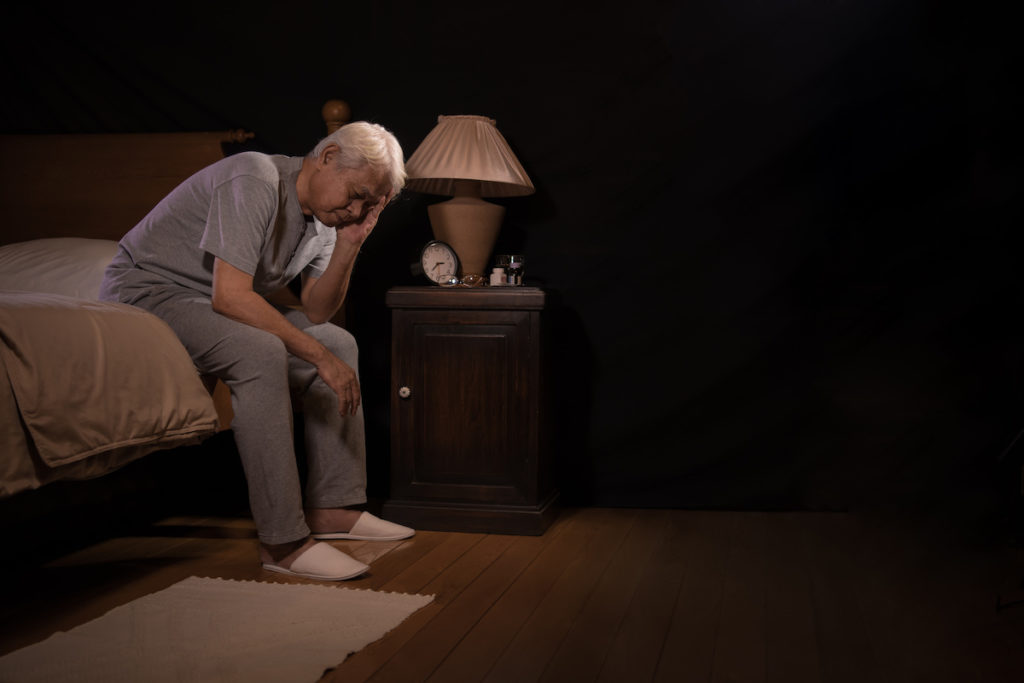 Sleepless Nights: Health Concerns, Caregiving, and Estate Planning for Seniors
Sleepless Nights: Health Concerns, Caregiving, and Estate Planning for Seniors
One issue older adults face is senior sleep disturbances. But a good night’s sleep is essential for everyone, but for older adults, achieving restful sleep can become a nightly challenge. While occasional sleeplessness is normal, for seniors, several factors can contribute to disrupted sleep, leading to anxiety and worry during those quiet nighttime hours. Let’s explore some of the common concerns that keep seniors awake at night, and how planning for the future can ease anxieties and promote better sleep.
Health Concerns and Disrupted Senior Sleep
As we age, our bodies naturally experience changes in sleep patterns. The production of melatonin, a hormone that regulates sleep, can decrease, making it harder to fall asleep and stay asleep. Additionally, many age-related health conditions can disrupt sleep. These include:
- Pain: Chronic pain from arthritis or other conditions can make it uncomfortable to lie in bed.
- Needing to use the restroom frequently: Urinary urgency and frequency, common in older adults, can lead to multiple nighttime trips to the bathroom.
- Sleep apnea: This condition briefly stops breathing during sleep, causing you to wake up gasping for air. It can disrupt sleep significantly.
- Dementia: In later stages, dementia can cause confusion and disorientation at night, leading to wandering and difficulty sleeping.
 Senior Sleep Loss: Older Adults Worrying About Who Will Care for Them
Senior Sleep Loss: Older Adults Worrying About Who Will Care for Them
The need for future care is a big concern for many seniors. They may wonder:
- Will I be able to live independently as I age?
- Who will help me with daily tasks if I can’t manage them on my own?
- Will my family be able to care for me, or will I need professional help?
- How will my care be paid for?
These uncertainties can be a source of anxiety and sleepless nights.
The Importance of Estate Planning

Having an up-to-date estate plan with long term care provisions in the event you become incapacitated or suffer from dementia, can significantly reduce anxieties about the future. An estate plan outlines your wishes regarding distribution of your assets after you are gone. It also outlines who will take care of you if you need care during your lifetime, how that care will be accomplished, and how the care will be paid for. The estate plan includes documents including a revocable living trust, certification of trust, pour over will, financial durable power of attorney, and healthcare directives.
Creating an Estate Plan Allows You To:
- Ensure that your wishes are followed: An estate plan avoids confusion and potential conflict among family members regarding your assets.
- Choose your caregiver: With a health care directive, you can designate a trusted person to make healthcare decisions if needed.
- Financial Durable Power of Attorney: With a financial durable power of attorney, you can designate who will make financial decisions for you in the event you become incapacitated or suffer from dementia.
- Reduce family burden: By having a clear plan, you can alleviate stress and anxiety for your loved ones when dealing with your affairs.
- Financial Planning: Long term care financial planning goes hand-in-hand with your estate plan, and attorneys and financial advisors often work together for their mutual clients in this regard.
Taking Steps for a Better Night’s Senior Sleep Here are some tips to promote better senior sleep:
Here are some tips to promote better senior sleep:
- Establish a regular sleep schedule: Go to bed and wake up at the same time each day, even on weekends.
- Create a relaxing bedtime routine: Take a warm bath, read a book, or listen to calming music before bed.
- Make sure your bedroom is sleep-conducive: Keep it cool, dark, and quiet.
- Limit caffeine and alcohol intake, especially in the evening.
- Get regular exercise, but avoid strenuous activity close to bedtime.
- Talk to your doctor about any sleep problems or concerns you have.
- Talk to your attorney and financial advisor about your long term care planning.
Planning for the future, both in terms of healthcare, estate planning and long term care financial planning, can significantly reduce anxieties and improve sleep quality for older adults. By taking charge and having open conversations with your loved ones, seniors can enter their golden years with greater peace of mind.
About Walnut Creek Elder Law in Walnut Creek, California
Michael J. Young is an experienced elder law, estate planning and asset protection planning attorney in Walnut Creek, CA. Mr. Young advises his clients regarding their estate planning needs with an emphasis on asset protection, Medi-Cal qualification, and preservation of assets for various levels of their care as they get older. Mr. Young’s journey into elder law began when his mother suffered from an acute injury that required her to be in a skilled nursing facility. He is co-author of the book, Don’t Go Broke in A Nursing Home and is the author of the “Alzheimer’s Legal Survival Guide.” Mr. Young presents monthly workshops in Walnut Creek regarding estate planning, asset protection, and Medi-Cal planning. He has helped many clients over the years successfully qualify for Medi-Cal and has protected their assets from state recovery. Call today to schedule a consultation (925) 256-0298.

